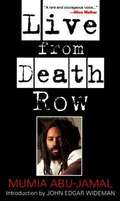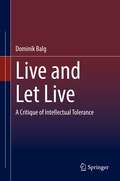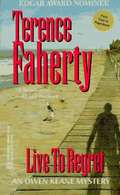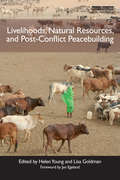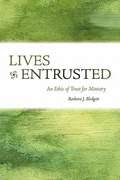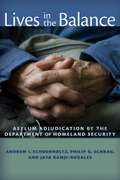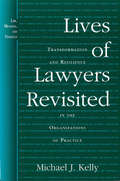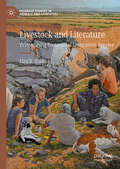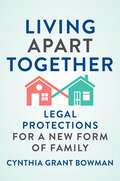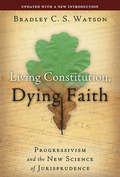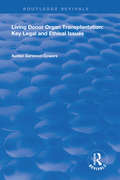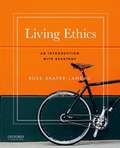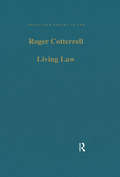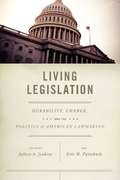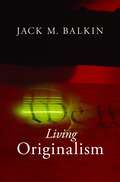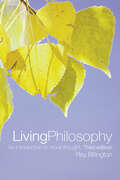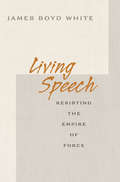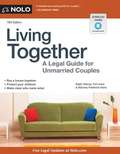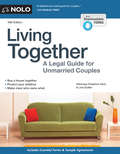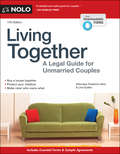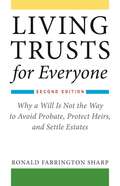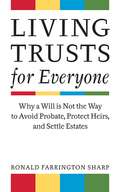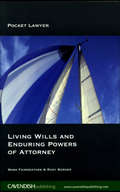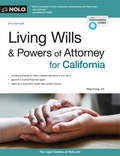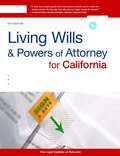- Table View
- List View
Live From Death Row
by Mumia Abu-JamalAwaiting execution for the murder of a Philadelphia policeman, the author describes the brutality and humiliation of prison life and argues that the justice system is racist and ruled by political expediency.
Live and Let Live: A Critique of Intellectual Tolerance
by Dominik BalgTolerance - desired by many and often demanded: By UNESCO, by the Pope, by Angela Merkel and Barack Obama. But what exactly does it mean to be tolerant? Does tolerance imply rejection? Or is tolerance merely the opposite of dogmatism? And how does a tolerant attitude differ from an indifferent one? Dominik Balg, starting from a well-founded explication of the concept of tolerance, subjects a tolerant attitude as an intellectual attitude toward conflicting opinions to a detailed critique and discusses the plausibility of general tolerance claims in specific domains such as politics, religion, or ethics. He considers possible alternatives to a tolerant attitude and presents with intellectual open-mindedness and humility two substantial attitudes that can be clearly distinguished from a tolerant attitude and - in contrast to tolerance - can also be easily demanded on a general level. - With a foreword by Thomas Grundmann. This book is a translation of the original German 1st edition Leben und leben lassen by Dominik Balg, published by J.B. Metzler, an imprint of Springer-Verlag GmbH Germany, part of Springer Nature in 2020. The translation was done with the help of artificial intelligence (machine translation by the service DeepL.com). A subsequent human revision was done primarily in terms of content, so that the book will read stylistically differently from a conventional translation. Springer Nature works continuously to further the development of tools for the production of books and on the related technologies to support the authors.
Live to Regret
by Terence FahertyEx-seminarian turned sleuth Owen Keane has been hired to look into the strange behavior of his friend and former colleague, Harry Ohlman, whose wife, Mary, was tragically killed in an auto accident. While observing Harry during his retreat in a small seashore town, Owen can't resist the allure of Diana Lord, an enigmatic beauty obsessed by a death that had occurred there many years before. But as Owen gets closer to the truth about Harry, he is forced to confront his own feelings for Mary and his unsettled score with his friend-as crimes of the heart, past and present, unfold in Spring Lake and a town gives up its secrets.
Livelihoods, Natural Resources, and Post-Conflict Peacebuilding (Post-Conflict Peacebuilding and Natural Resource Management)
by Helen Young Lisa GoldmanSustaining and strengthening local livelihoods is one of the most fundamental challenges faced by post-conflict countries. By degrading the natural resources that are essential to livelihoods and by significantly hindering access to those resources, conflict can wreak havoc on the ability of war-torn populations to survive and recover. This book explores how natural resource management initiatives in more than twenty countries and territories have supported livelihoods and facilitated post-conflict peacebuilding. Case studies and analyses identify lessons and opportunities for the more effective design of interventions to support the livelihoods that depend on natural resources – from land to agriculture, forestry, fisheries, and protected areas. The book also explores larger questions about how to structure livelihoods assistance as part of a coherent, integrated approach to post-conflict redevelopment. Livelihoods and Natural Resources in Post-Conflict Peacebuilding is part of a global initiative to identify and analyze lessons in post-conflict peacebuilding and natural resource management. The project has generated six books of case studies and analyses, with contributions from practitioners, policy makers, and researchers. Other books in this series address high value resources, land, water, assessing and restoring natural resources, and governance.
Lives Entrusted: An Ethic of Trust for Ministry (Prisms Series)
by Barbara J. BlodgettThis book is about communities of faith and their leaders, and it argues that they should better learn how to practice trust. The book comprises five chapters. Chapter 1 defines trust and explains how it works between individuals and within communities. Chapter 2 takes up the issue of confidentiality in the ministry. Chapter 3 draws upon the work of Michael Power on the proliferation of "audit societies." Chapter 4 addresses gossip, and Chapter 5 deals with the temptation of clergy to bullshit.
Lives in the Balance: Asylum Adjudication by the Department of Homeland Security
by Philip G. Schrag Andrew I. Schoenholtz Jaya Ramji-NogalesAlthough Americans generally think that the U.S. Department of Homeland Security is focused only on preventing terrorism, one office within that agency has a humanitarian mission. Its Asylum Office adjudicates applications from people fleeing persecution in their homelands. Lives in the Balance is a careful empirical analysis of how Homeland Security decided these asylum cases over a recent fourteen-year period.Day in and day out, asylum officers make decisions with life-or-death consequences: determining which applicants are telling the truth and are at risk of persecution in their home countries, and which are ineligible for refugee status in America. In Lives in the Balance, the authors analyze a database of 383,000 cases provided to them by the government in order to better understand the effect on grant rates of a host of factors unrelated to the merits of asylum claims, including the one-year filing deadline, whether applicants entered the United States with a visa, whether applicants had dependents, whether they were represented, how many asylum cases their adjudicator had previously decided, and whether or not their adjudicator was a lawyer. The authors also examine the degree to which decisions were consistent among the eight regional asylum offices and within each of those offices. The authors’ recommendations, including repeal of the one-year deadline, would improve the adjudication process by reducing the impact of non-merits factors on asylum decisions. If adopted by the government, these proposals would improve the accuracy of outcomes for those whose lives hang in the balance.
Lives of Lawyers Revisited: Transformation and Resilience in the Organizations of Practice
by Michael J. KellyThe past two decades have seen profound changes in the legal profession. Lives of Lawyers Revisited extends Michael Kelly's work in the original Lives of Lawyers,offering unique insights into the nature of these changes, examined through stories of five extraordinarily varied law practices. By placing the spotlight on organizations as phenomena that generate their own logic and tensions,Lives of Lawyers Revisited speaks to the experience of many lawyers and anticipates important issues on the professional horizon. "Michael Kelly has done it again! His Lives of Lawyers Revisited is a very easy read about some very difficult notions like 'litigation blindness' and law as a business. It presents some fascinating perspectives on our profession." --J. Michael McWilliams, Past President, American Bar Association. "The best single book about the American realities and possibilities of the American legal profession, combining an empathic and insightful account of law practice with a penetrating analysis of the wider context of professional work." --Marc Galanter, University of Wisconsin. "Michael Kelly believes that professional values and conduct are not realized in codes, but in the experiences of practice, and that practice draws its routines and ideals from organizations. Through his studies of lawyers in various firms, closely observed and sympathetically described, Kelly reveals how differently organizations adapt to the intense pressures of today's practice environment. His method of linking individual life-experiences to organizational strategies and the external constraints of competition and client demands infuses realism and richness into the concept of professionalism and makes this one of the most interesting and original books on professions and professionalism to appear in years." --Robert W. Gordon, Yale Law School. "In his two volumes of Lives of Lawyers, Michael Kelly explores legal ethics in an unusual, and unusually rewarding, way. Rather than focusing on rules or arguments, Kelly looks at the kind of lives lawyers lead. Ethics, Socrates thought, is about how to live one's life, and Kelly takes the Socratic question to heart. He explores the institutions lawyers work in and the choices they make. He writes with intelligence, great insight, and above all with heart. This is a superb book." --David Luban, Georgetown University. Michael J. Kelly is President and Chairman of the Board of the National Senior Citizens Law Center, an advocacy group for older Americans of limited means.
Livestock and Literature: Reimagining Postanimal Companion Species (Palgrave Studies in Animals and Literature)
by Liza B. BauerThis book explores the past and current traces that cows, pigs, chickens, and other animals used by humans have left in Anglophone literary fiction. In times of accelerated global warming, an acute pandemic, and breakthroughs in bioengineering practices, discussions on how to rethink the relationships to these animals have become as heated as perhaps never before. Livestock and Literature examines what literature has to contribute to these debates. In particular, it draws on counter-narratives to so-called livestock animals’ commodification in selected science- and speculative fiction (SF) works from the twenty-first century. These texts imagine ‘what if’ scenarios where “livestock” practice resistance, transform into biotechnologically modified, postanimal beings, or live in close companionship to humans. Via these three points of access, the study delineates the formal and thematic strategies SF authors apply to challenge anthropocentric and speciesist thought patterns. The aim is to shed light on how these alternative storyworlds expand readers’ understanding of the lives of farmed animals; seeking insight into how literature shapes human-animal relationships beyond the page.
Living Apart Together: Legal Protections for a New Form of Family (Families, Law, and Society #15)
by Cynthia Grant BowmanArgues for legal reforms to protect couples who live apart but perform many of the functions of a familyLiving Apart Together is an in-depth look at a new way of being a couple and “doing family”—living apart together (LAT)—in which committed couples maintain separate residences and finances. In Bowman’s own 2016 national survey, 9% of respondents reported maintaining committed relationships while living apart, typically spending the weekend together, socializing together, taking vacations together, and looking after one another in illness, but maintaining financial independence. The term LAT stems from Europe, where this manner of coupledom has been extensively studied; however, it has gone virtually unnoticed in the United States.Living Apart Together aims to remedy this oversight by presenting original research derived from both randomized surveys and qualitative interviews. Beginning with the large body of social science literature from outside the US, Cynthia Bowman examines the prevalence of this lifestyle, the demographics of people who live apart, their reasons for doing so, and how these individuals manage finances, care during illness, and many other aspects of family life. She focuses in particular detail on three key demographics—women, gay men, and the elderly—and how individuals from these groups engage in LAT behavior. She finds that while these living arrangements are more common than previously believed, there are virtually no legal protections for the people involved. Bowman concludes by proposing a number of legal reforms to support the caregiving functions LAT partners perform for each other. Living Apart Together makes an important case for formal recognition of this growing but largely overlooked family structure.
Living Constitution, Dying Faith: Progressivism and the New Science of Jurisprudence (American Ideals And Institutions Ser.)
by Bradley C. WatsonA &“living&” constitution. Runaway courts. Legislating from the bench. These phrases come up a lot in the national political debate. They raise the ire of many Americans. But where did the ideas come from? Why do courts play a role so alien to the one the American Founders outlined? And how did unelected judges gain so much power in our democratic republic? Political scientist and legal philosopher Bradley C. S. Watson provides the answers in this important book. To understand why courts today rule the way they do, Watson shows, you must go back more than a century. You&’ll find the philosophical and historical roots of judicial activism in the late nineteenth century. Watson traces a line from social Darwinism and pragmatism, through the rise of Progressivism, to our situation today. Living Constitution, Dying Faith reveals a radical transformation of American political thought. This ebook features a new introduction examining the latest developments—which only highlight the prescience of Watson&’s arguments.
Living Donor Organ Transplantation: Key Legal and Ethical Issues (Routledge Revivals)
by Austen Garwood-GowersThis book was originally published in 1999. When one or more essential organs failed, the consequence used to be death. However, conventional medicine has developed artificial means of extending life, the most successful of which is transplantation. The most common form of organ to be transplanted is a kidney which will, on average, function for about a decade in its recipient. Organ transplantation as a whole is widely practiced in most countries. However, few can procure enough organs to meet demand. Many people who are suitable for a transplant die without getting one. Many kidney patients can access and stay alive on dialysis until a suitable organ becomes available. However, even here, sufficiency of organs would be beneficial because lesser reliance on dialysis would reduce healthcare costs and be better for patient quality of life. This invaluable book shows that in the light of current practice and attitudes, increasing living donor transplantation (LDT) levels is feasible. It is one of the few works to systematically analyse the ethical and legal issues involved in LDT use in the light of empirical evidence, including new data derived from a unique programme of interviews and questionnaires with transplant professionals, living donors and recipients. Readers are led to an understanding of when LDT is ethically and legally acceptable and to the strong case for using it much more extensively.
Living Ethics: An Introduction With Readings
by Russ Shafer-LandauLiving Ethics: An Introduction with Readings is an ideal all-in-one resource for courses in introduction to ethics and contemporary moral problems. In this hybrid textbook/reader, Russ Shafer-Landau brings moral theory and contemporary moral issues to life with a comprehensive and balanced set of readings, uniquely engaging explanations, and clear analysis of arguments. <p><p> The book balances coverage of moral reasoning (in Part 1) with highly relevant contemporary moral problems (in Part 2). <p> Part 2 also features a rich collection of pedagogical tools to help students understand and think critically about the various contemporary moral issues discussed: <p> * Just the Facts: Provides students with relevant factual material, offering necessary background for the book's ethical investigations <p> * Argument Analysis: Reconstructs and critically assesses a battery of arguments on the topics of the chapter <p> * Essential Concepts: Key terms that are placed in bold on first mention in the text (also available in the glossary) <p> * Stat Shots: Visual presentations of quantitative data provide additional context for the chapter's subject matter <p> * Cases for Critical Thinking: Often taken from headlines, these exercises are designed to invite deeper reflection on issues related to the chapter topic
Living Law: Studies in Legal and Social Theory (Collected Essays In Law Ser.)
by Roger CotterrellLiving Law presents a comprehensive overview of relationships between legal and social theory, and of current approaches to the sociological study of legal ideas. It explores the nature of legal theory and sociolegal studies today as teaching and research fields, and the work of many of the major sociolegal theorists. In addition, it sets out the author's distinctive approach to sociological analysis of law, applying this in a range of studies in specific legal fields, such as the law of contract, property and trusts, constitutional analysis, and comparative law.
Living Legislation: Durability, Change, and the Politics of American Lawmaking
by Jenkins Jeffery Patashnik Eric M.Politics is at its most dramatic during debates over important pieces of legislation. It is thus no stretch to refer to legislation as a living, breathing force in American politics. And while debates over legislative measures begin before an item is enacted, they also endure long afterward, when the political legacy of a law becomes clear. Living Legislation provides fresh insights into contemporary American politics and public policy. Of particular interest to the contributors to this volume is the question of why some laws stand the test of time while others are eliminated, replaced, or significantly amended. Among the topics the essays discuss are how laws emerge from--and effect change within--coalition structures, the effectiveness of laws at mediating partisan conflicts, and the ways in which laws interact with broader shifts in the political environment. As an essential addition to the study of politics, Living Legislation enhances understanding of democracy, governance, and power.
Living Originalism
by Jack M. BalkinOriginalism and living constitutionalism, so often understood to be diametrically opposing views of our nation’s founding document, are not in conflict—they are compatible. So argues Jack Balkin, one of the leading constitutional scholars of our time, in this long-awaited book. Step by step, Balkin gracefully outlines a constitutional theory that demonstrates why modern conceptions of civil rights and civil liberties, and the modern state’s protection of national security, health, safety, and the environment, are fully consistent with the Constitution’s original meaning. And he shows how both liberals and conservatives, working through political parties and social movements, play important roles in the ongoing project of constitutional construction. By making firm rules but also deliberately incorporating flexible standards and abstract principles, the Constitution’s authors constructed a framework for politics on which later generations could build. Americans have taken up this task, producing institutions and doctrines that flesh out the Constitution’s text and principles. Balkin’s analysis offers a way past the angry polemics of our era, a deepened understanding of the Constitution that is at once originalist and living constitutionalist, and a vision that allows all Americans to reclaim the Constitution as their own.
Living Philosophy: An Introduction to Moral Thought
by Ray BillingtonFirst published in 2003. Routledge is an imprint of Taylor & Francis, an informa company.
Living Speech: Resisting the Empire of Force
by James Boyd WhiteLanguage is our key to imagining the world, others, and ourselves. Yet sometimes our ways of talking dehumanize others and trivialize human experience. In war other people are imagined as enemies to be killed. The language of race objectifies those it touches, and propaganda disables democracy. Advertising reduces us to consumers, and clichés destroy the life of the imagination. How are we to assert our humanity and that of others against the forces in the culture and in our own minds that would deny it? What kind of speech should the First Amendment protect? How should judges and justices themselves speak? These questions animate James Boyd White's Living Speech, a profound examination of the ethics of human expression--in the law and in the rest of life. Drawing on examples from an unusual range of sources--judicial opinions, children's essays, literature, politics, and the speech-out-of-silence of Quaker worship--White offers a fascinating analysis of the force of our languages. Reminding us that every moment of speech is an occasion for gaining control of what we say and who we are, he shows us that we must practice the art of resisting the forces of inhumanity built into our habits of speech and thought if we are to become more capable of love and justice--in both law and life.
Living Together
by Ralph WarnerLiving together out of wedlock can mean anything, especially in court -- unlike married couples, most unmarried couples don't automatically inherit or receive protection under the law. Consequently, you must document everything from property ownership and children to wills and other estate plans. An essential resource for any unmarried couple, Living Together explains: -the legality of living together -having and raising children -the many types of ownership agreements -relationships with a prior family -getting authorization to make medical decisions for an ill or injured partner Living Together includes: -a complete overview of important legal documents, including a living together contract -instructions to filling out these documents -sample forms -legal agreements This edition provides the latest law in readable 50-state charts, and includes many fill-in-the-blank legal forms. It also discusses the laws covering same-sex marriages and civil unions, which are often so broad, they affect unmarried heterosexual couples as well.
Living Together: A Legal Guide for Unmarried Couples
by Frederick Hertz Lina GuillenFind answers you need br> Living together out of wedlock can mean anything, especially in court—unlike married couples, Unmarried couples living together should take certain precautions, whether you've lived together for years on end, or are simply considering the idea. For over 35 years, Living Together has been helping unmarried couples of all ages deal with the big legal and practical issues involved with living together: buying or renting a house; sharing checking accounts, credit cards, and property (or keeping everything separate); having and raising children; writing wills and estate plans; getting authorization to make medical decisions for an ill or injured partner; and breaking up. This book is completely updated for 2017, with the latest laws affecting unmarried couples in a wide variety of areas—family law, debt and credit, real estate, taxes, medical care, insurance, estate planning, and more. Includes dozens of sample forms and contracts, such as an Agreement to Keep Property Separate.
Living Together: A Legal Guide for Unmarried Couples
by Frederick Hertz Lina GuillenAll the law cohabiting couples need to know Laws that protect married couples—on property ownership, divorce, inheritance rights, and more—don’t apply to unmarried couples. To define and protect your relationship—and your assets—you need to take specific legal steps and use the right documents. Whether you’re just starting out or are one of the growing number of older couples who choose to live together, this revised edition has the information you need. It covers all the big issues facing unmarried couples living together, including: Money and Property Clarify how you’ll share money and other assets. Estate Planning Leave your assets to whomever you wish, including children from a prior marriage. Breaking Up Divide property and share child custody fairly. Children Protect your kids by confirming that you are their legal parents. The House If you buy a house together, spell out ownership shares in writing. Medical Decisions Make important medical decisions for each other if necessary. With downloadable forms:customize more than a dozen legal forms, including living together and property agreements, house ownership contract, acknowledgment of parenthood, property settlement agreement, and more.
Living Trusts for Everyone: Why a Will Is Not the Way to Avoid Probate, Protect Heirs, and Settle Estates (Second Edition)
by Ronald Farrington SharpReaders say it best: "Very informative", "saved me a lot of money and headaches!", "recommend it for everyone who has to plan estates for their elderly parents"Living Trusts for Everyone is the best resource for setting up a living trust. Explaining in specific terms what benefits a trust will have, Ronald Farrington Sharp gives the tools necessary to set up a loved one’s trust with no lawyers and no expense. Wills benefit lawyers. Trusts benefit the clients. Too often lawyers sell wills to clients only to sit back and wait to sell their probate services to their clients’ heirs. Ronald Farrington Sharp describes the best way to handle modern estate planning and details the many advantages trusts have over wills in not only eliminating probate but in also protecting your assets for your heirs. Sharp explains why legal services are not needed to do the clerical work in settling a trust after death. This updated edition includes new information on an array of subjects, including:Elimination of the federal estate tax for most estates due to increased exemption amountsOnline assetsThe use of passwords, usernames, and websitesKeeping trustees honest and the process of removing trustees for malfeasanceForms for simplifying the planning processStrategies to lower attorneys’ fees>/li> With no legal jargon, just step-by-step instructions and sample form letters, Living Trusts for Everyone takes the mystery out of the process of setting up a trust.
Living Trusts for Everyone: Why a Will is Not the Way to Avoid Probate, Protect Heirs, and Settle Estates
by Ronald Farrington SharpThe misconceptions surrounding the last will and testament need to be put to rest: Wills benefit lawyers. Trusts benefit you. Period. <P><P>Too often lawyers sell wills to clients only to sit back and wait to sell their probate services to their client' s heirs. Modern estate planning should utilize the Living Trust as the effective, efficient, and inexpensive alternative to a will. Living Trusts for Everyone: Why a Will is Not the Way to Avoid Probate, Protect Heirs, and Settle explains why wills are not the best way to handle an estate and details the many advantages trusts have over wills in not only eliminating probate, but protecting your assets for your heirs. Anyone with minor children, disabled beneficiaries, blended families, or spendthrift heirs must have a trust to be sure the assets left behind are put to good use, and that your intentions are carried out. Lawyers may have vested interests in perpetuating the probate system, but this book will explain why legal services are not needed to do the clerical work in settling a trust after death. No legal jargon or confusing double-speak, just specific step-by-step instructions and sample form letters to settle a trust are included to take the mystery out of the process. This is not a do-it-yourself book and it doesn't try to cram every type of trust onto its pages. Living Trusts for Everyoneexplains in specific terms what benefit a trust will have for you and gives you the tools to settle a loved one's trust with no lawyers and no expense. For those who already have a trust, there is a list of what to look for to see if your trust is any good, or if it needs to be updated. Trust seminars are examined with warnings on what to look out for in setting up your trust. Everyone who cares about what happens to their assets at death should read Living Trusts for Everyone: Why a Will is Not the Way to Avoid Probate, Protect Heirs, and Settle!
Living Wills and Enduring Powers of Attorney (You Need This Book First Ser.)
by Mark Fairweather Rosy BorderThis book allows you to decide whether a living will is for you and offers a plain English living will to make your wishes known and how to grant an EPA allowing those you trust to manage your affairs.
Living Wills and Powers of Attorney for California
by Shae IrvingA serious accident or illness can happen to anyone at any time. That’s why everyone should have these essential documents: An advance health care directive (also called a living will and durable power of attorney for health care), which lets you state your wishes for end-of-life medical care and name a trusted person who will work with your doctors to be sure you get the kind of care you want. A durable power of attorney for finances, which lets you appoint someone you trust to manage your finances for you if you no longer can. The book explains how to create these forms to comply with California law, and how they can be used to help your family. The book also contains instructions for obtaining a Do Not Resuscitate (DNR) order or a Physician Orders for Life-Sustaining Treatment (POLST) form, either of which can be used to let emergency medical responders know that you don’t want certain extreme measures to be used to revive you. Includes forms for both medical care and finances. New edition is fully updated for 2018.
Living Wills and Powers of Attorney for California
by Shae Irving J.D.A serious accident or illness can happen to anyone at any time. That’s why everyone should have these essential documents: An advance health care directive (also called a living will and durable power of attorney for health care), which lets you state your wishes for end-of-life medical care and name a trusted person who will work with your doctors to be sure you get the kind of care you want. A durable power of attorney for finances, which lets you appoint someone you trust to manage your finances for you if you no longer can. The book explains how to create these forms to comply with California law, and how they can be used to help your family. The book also contains instructions for obtaining a Do Not Resuscitate (DNR) order or a Physician Orders for Life-Sustaining Treatment (POLST) form, either of which can be used to let emergency medical responders know that you don’t want certain extreme measures to be used to revive you.
